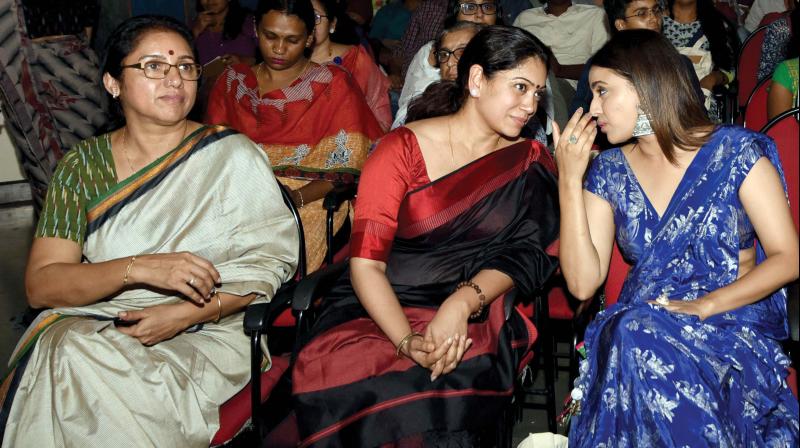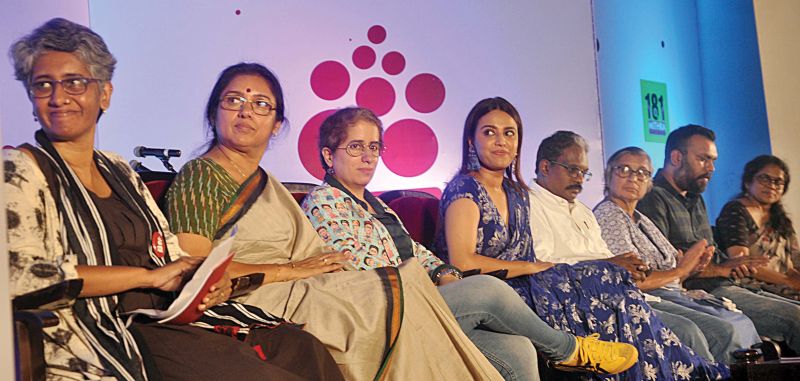Celebrating sisterhood

At the auditorium of St. Teresa’s College, Ernakulam, everyone who gathered for the second anniversary celebrations of the Women in Cinema Collective (WCC) on Friday looked so exuberant. It was, indeed, a moment of victory and jubilation for them, because it had never been easy to reach this far. They had to face wrath, criticism and even hatred from a section of society for coming up with an exclusive platform for women.
 Dignitaries during the second anniversary celebrations of WCC
Dignitaries during the second anniversary celebrations of WCC
But, the members are glad that opposing voices existed, for they encouraged them to fight and move forward. As writer and director Anjali Menon, who is also a member of WCC, puts it, only change that happens organically will stay forever. “If a change happens suddenly, I will be wary of it. Only slow and steady change will stay,” she says and believes that it requires a certain amount of openness to listen to and understand others’ views. “I respect their opinions. For us, it is a matter of being stable and doing our work. Our work should speak.”
That is what they have been doing these two years. They have been working so hard, taking extra time from their busy schedules, to bring a structure to their organisation and to collaborate with like-minded people and organisations. Their website wccollective.org launched on Friday, and an array of dignitaries that include director Pa. Ranjith, bollywood actor Swara Bhaskar, Health Minister K.K. Shailaja, writer Shyam Pushkaran, Oscar winning producer Guneet Monga and lawyer and women’s rights activist Vrinda Grover, who graced the anniversary celebrations, are examples to their effort. “We have learnt a lot in these two years. It was like taking care of a baby that has just started to stand up and walk,” says Anjali. “WCC was formed suddenly. The evolution happened quite organically.
We all came together in the moment of trauma, emphathising with the situation. We could relate to it. After that we contemplated what we should do as an organisation. We realised that, for an organisation like this, there should be a proper arrangement. Hence, we registered as a society. Then, we started interacting with other organisations that work in the similar area,” explains Anjali.
She says their responses were overwhelming. “They were completely welcoming,” she says. “They knew about us and our activities, and were willing to help us. They shared their resources with us. For instance, the Producers’ Guild was happy to publish their handbook, which details all things a woman in the industry should be careful about, on our website”
The website that details everything women need to know about the industry and their rights is, in fact, a guide to all women who would love to venture in the industry. “Now, a girl sitting in Kerala who wants to enter the film industry will be able to comprehend the situation by visiting our website. There are things we do internally. If a person wants to make a film and has doubts about certain aspects, she can reach to us. She will be provided with professional aid. I am a writer and director and I can help with that. But, I may not be able to advise on the technical side. In that case, I can connect her to Bina,” she explains. “Also, the website content will be available in Malayalam in the future. There will be an option to switch languages.”
The effort is to make the path easier for the future generation. Because, for women, the journey is tough and there are many attitudes to deal with. “The steps on the ladder are few for them,” says Anjali, who feels that the best part of WCC is that it is a democratic platform. “Before WCC, we all were tiny islands lived in our own worlds. WCC gave us a platform to share our thoughts.
You can see that bonding here. There is an understanding between us. Today, Swara came and we took photos like friends who have been meeting after a long time. It is because we have been through the same journey,” says Anjali. “Men have their fraternity to talk. This is our space. There is chemistry between all of us. That is a rare thing to see. Also, the organisation is not bound by hierarchy. If we have a decision to take, we talk to everyone. Take the case of the website development. Every stage of development was shown to all of us. We talk, debate, but in a healthy manner. Isn’t that lovely?” asks Anjali. “People say that women don’t get along. See us,” she smiles with a twinkle in her eyes.
And, as a team, they are committed to continue their selfless work to shape their space. “It’s our home and we volunteer works. Why should we wait for someone else to work for us?”

